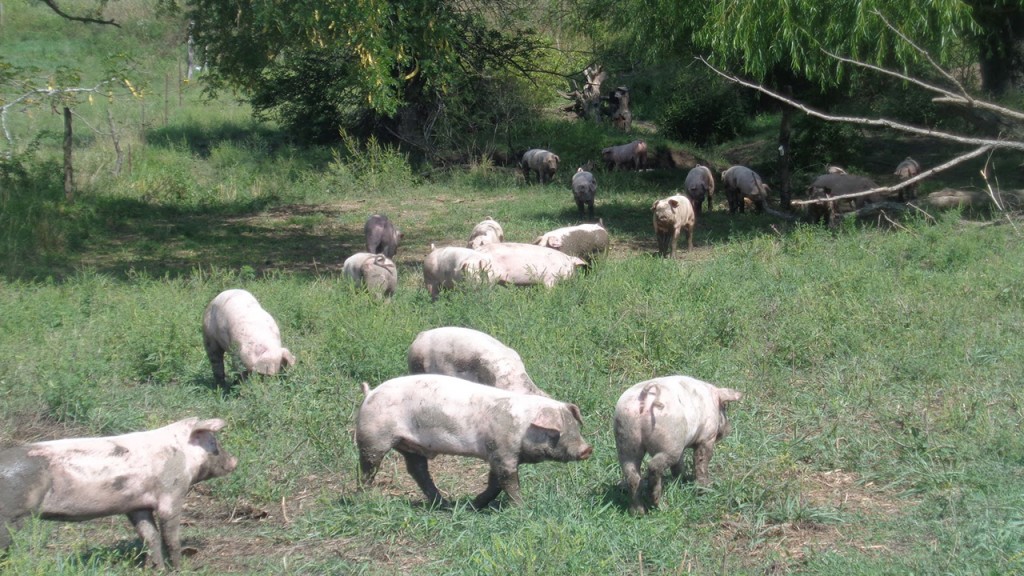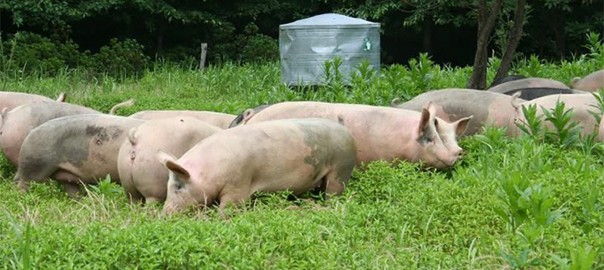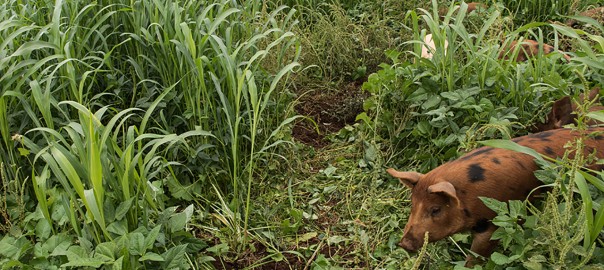I’ve just walked back in from tending to our pastured pigs. Rotating them to new pasture is quite a process and usually takes about 30 minutes.
But that work time allowed me to watch purple martins dip and roll through the sky. I listened to red-winged blackbirds and western meadowlarks sing, and I heard woodpeckers tap, tap, tapping their way through the woods.
Singing Prairie Farm is brimming with life these days. We hear wild turkeys and coyotes daily, and consider each one a blessing — yes, even the howling wild canines. A hundred kinds of birds fill the air with their song.
The Prairie here, quite literally, sings.
Our family farm is in the northeast corner of Missouri. The land here is an ocean of small rolling hills and creeks interspersed equally with cattle pasture and timber. There is not a truly flat spot of ground within walking distance of my kitchen table.
Our pigs run over about 50 acres of ground. Each year we raise about 250 pigs on pasture in a way that is careful of existing wildlife, sequesters carbon, enriches our grassland ecosystem, and offers a level of respect and caring to the pigs that we would want if we were them.
We raise our pigs in groups of 35 to 50; currently, a single strand of electrified poly-wire, hung about 18 inches off the ground is enough to keep them in the correct paddock. We rotate them when they have eaten all the grass and fertilized the run sufficiently for the year. That grazing process typically takes about a week. In the cool of spring and fall, we keep them moving about the prairie. When the heat of summer descends upon us, they move into the woods where the breezes are cool, and there is plenty of shade.
Moving them isn’t a very cumbersome process. I simply move the pigs’ feeders, waterer, and rain shelters into the new fenced run. Then, I lift up one of the tread-in fence posts that hold the electric wire so they can easily run beneath. The moment the wire goes up, they usually hesitate briefly, remembering that just a second ago there had been an electric wire in place. Then the “alpha” animal usually leads the “run,” as they wander over to the feeders which are full of about 8 pounds of 100% non-GMO grain. Quite often there are trees in the run for them to scratch their backs on. There are always acorns, worms, grubs, grass, roots, and clover to eat during the short transition.
Raising pigs this way allows the pigs to live happily, while also letting them get plenty of exercise. It allows pigs to experience life naturally and happily in a mostly stress-free environment. They spend their ample free-time mostly eating grass. This consumption of grass is what is so good for us, the humans.
One day we will harvest these special, sacred animals and consume them. In the roundabout mechanics of our digestion, we will replace the old, worn out cells of our bodies with the new fresh cells of their bodies. The realization that one day their flesh will be my flesh and that their blood in some small way will become my blood creates a unique bond. One that can never be dismissed or taken for granted.
At times like this, I think of the Lakota Sioux people. As Native Americans of the Northern Plains, their lives revolved around the buffalo. Its hide, its bones, and its meat were their mainstays. Their culture would not have thrived in that arid and cold habitat if not for their relationship to the buffalo. The fact that they required the buffalo to survive made them approach the species with sacred reverence.
Today, it’s important to pause to recognize the sacredness of all the food we depend upon to build and fuel our bodies. Let’s all take responsibility to care for both plants and animals in a tender and respectful way.
There is a simple beauty each day in raising pigs naturally here on Singing Prairie Farms.





